Engage in AccessComputing
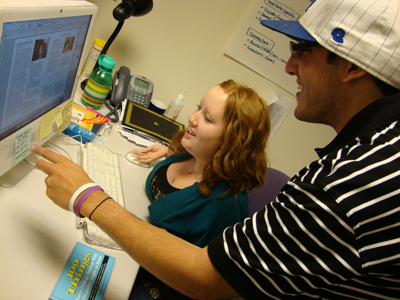 Students with disabilities:
Students with disabilities:
- Internships
- E-mentoring
- AccessComputing Team
- Summer programs
Educators & employers:
- Host an intern
- Communities of practice
- E-mentoring
This page features all the articles from the AccessComputing News - January 2010 newsletter. This newsletter can also be viewed article by article on the AccessComputing News - January 2010 page.
 Students with disabilities:
Students with disabilities:This fall, I spoke about accessible technology in my "New Directions in Accessible Computing" lecture at North Carolina State University (NCSU). My talk was part of the Triangle Computer Science Distinguished Lecturer Series. It was telecast to Duke University and the University of North Carolina.
In my talk, I described ways that people with disabilities can use technology to create or configure their own accessibility solutions. This non-paternalistic approach respects the ability of persons with disabilities to determine their own destinies.
For example, if a person who is blind uses an iPhone they can download accessible applications using the phone's VoiceOver feature. New technology is also being developed that allows the user to access phone content through vibrations that represent Braille characters.
Before my lecture, I was able to connect with NCSU students, faculty, and staff. I met Sina Bahram, an NCSU computer science Ph.D. candidate who is blind. I learned about various projects at NCSU, University of North Carolina, and Duke that may have a future impact on people around the world, including those with disabilities.
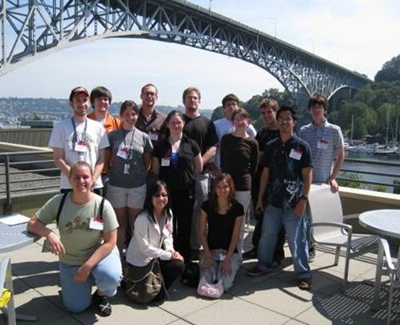 A large crowd of family, friends, and community members attended the Community Premiere to honor the ten students who finished the nine-week 2009 Summer Academy for Advancing Deaf and Hard of Hearing in Computing. Held at the University of Washington, this event showcased the animated films the students created. These animation shorts can be viewed at http://www.uw.edu/accesscomputing/dhh/academy/projects.html.
A large crowd of family, friends, and community members attended the Community Premiere to honor the ten students who finished the nine-week 2009 Summer Academy for Advancing Deaf and Hard of Hearing in Computing. Held at the University of Washington, this event showcased the animated films the students created. These animation shorts can be viewed at http://www.uw.edu/accesscomputing/dhh/academy/projects.html.
Of course at the Summer Academy it was not always nose to the grindstone working on films and attending computer programming classes. Students also went on field trips to Adobe, Google, Intel, Microsoft, and Valve, where they met employees who are deaf and hard of hearing and work in computing fields. They met the president of Valve and previewed a new game weeks before its release to the general public. Summer Academy students met guest speakers who were deaf and hard of hearing from companies including Viable Video Relay Service, CSDVRS, Oracle, Cray, Group Health, DeafCode, and IBM. The speakers discussed computing jobs and accessible workplaces. Besides academic and career preparation work, the students socialized during activities that included a Ride the Ducks boat tour and a Mariners baseball game.
Academy participants were from Alaska, Arkansas, Indiana, Maine, Maryland, Texas, Virginia, and Washington. Three were high school students, two were in college, and the rest were recent high school graduates. In addition, two students from the 2008 Summer Academy worked as animation tutors and took a more advanced computer science course than they took in 2008. A student who is deaf from Rochester Institute of Technology (RIT) was hired as a teaching assistant for computer programming courses and a resident assistant in the dorms. Additionally, Pam Siebert from IBM in Kansas City stayed for four weeks as a programmer-in-residence.
The Summer Academy has been in operation for three years. I met up with several of our graduates this summer. Updates from two of the participants are summarized below.
Jason, a 2007 Academy alumnus, completed an internship at NASA, where he worked on developing an interactive web page for the Image Science and Analysis Group at the Johnson Space Center in Texas. The web page offers scientists the ability to view images from the space shuttle and International Space Station. Image scientists analyze these images for debris from space shuttle lift-off and re-entry. Jason credits the Summer Academy for giving him a push in the right direction.
Bobby, another 2007 program alumnus, entered the RIT National Technical Institute for the Deaf and was planning to pursue a career as a math teacher then decided to major in filmmaking instead. He acknowledged that participation in the Summer Academy helped him pursue his new career goals. Of particular value was the Summer Academy animation class, including script writing, story development, lighting and shadow, pacing, and editing.
To read an article published in the Seattle Times about the Summer Academy, visit http://seattletimes.nwsource.com/html/education/2009555657_deafacademy28m.html
Five deaf and hard-of-hearing students from California, Iowa, Minnesota, Pennsylvania, and Washington attended a one-week Summer Computing Experience at the University of Washington. This was an opportunity for high school students to experience what computing is all about. They went on field trips to Adobe, Google, Valve, and Microsoft's Home of the Future and had fun learning about Seattle on the famous Ride the Ducks tour.
Every morning the students attended an animation class and learned basic animation techniques, as well as the programming aspects behind animation cells. They also met the three principals of DeafCode and learned about entrepreneurship in computing. Motivated by this exciting introduction, some participants are now thinking about applying for the 2010 Summer Academy!
For a person with a visual impairment, a computer can initially present some accessibility challenges. However, there are a wide variety of software products available to help people of all abilities access and use a computer. One of the more popular products for people with visual impairments is a screen reader that uses a digital voice to read aloud text that appears on a computer screen. While a very helpful tool in making a specific computer accessible, screen readers are not always installed on public computers in libraries and Internet cafés.
To make speech output available on any computer at any time, University of Washington alumnus Jeffrey Bigham developed WebAnywhere. Anyone can use this product with almost any web browser and operating system, without the need for additional software. WebAnywhere even predicts web content that may interest the user based on the individual's past history, and it pre-loads speech patterns allowing instant audio access to on-screen content.
Unlike many screen readers, WebAnywhere is free of charge. It can be accessed from https://webinsight.cs.washington.edu/wa/.
Bigham was recognized as one of Technology Review's 2009 Young Innovators Under 35 for his creation of WebAnywhere and is currently an assistant professor in the Computer Science department at the University of Rochester.
AccessComputing engages stakeholders through a variety of ways, including Communities of Practice (CoPs). CoP members communicate using email and other electronic tools. They share perspectives and expertise and identify practices that promote the participation of people with disabilities in computing fields. Five project CoPs are described below.
To join an AccessComputing CoP, send your name, position/title, institution, postal address, email address, and which of the five CoPs you would like to join to accesscomp@uw.edu.
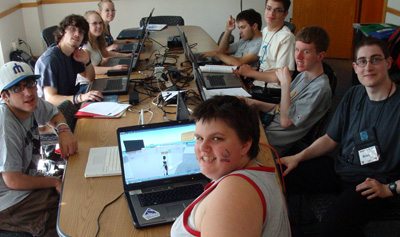 There are a lot of great reasons for you to work as an intern while you are in college. You'll gain confidence, develop new skills, and improve your resume. You can improve work habits and learn what jobs you may want (or may want to avoid) after graduation.
There are a lot of great reasons for you to work as an intern while you are in college. You'll gain confidence, develop new skills, and improve your resume. You can improve work habits and learn what jobs you may want (or may want to avoid) after graduation.
Employers want experience! They also want to be able contact your former supervisors and hear about your work as they seek out the best and brightest workers. DO-IT's AccessComputing project has helped more than fifty students land paid internship positions in the last year. Some interns also received college credit for their work.
Interns have worked on computer programming, computing research, and in various workshops and labs. Some specific examples of paid internships completed by AccessComputing interns include
Computing students with disabilities nationwide are encouraged to contact DO-IT about paid internships. Opportunities include computing research on college campuses, computing projects for companies, and opportunities to work for government agencies and non-profit organizations. Request more information by sending a message to doit@uw.edu.
Youth Slam—an annual, week-long academy for students who have visual impairments—was held this summer at the University of Maryland. Youth Slam is sponsored by the National Federation of the Blind and its goal is to encourage students with visual impairments to seek out and explore careers in the fields of science, technology, engineering, and math. Attendees participated in a number of activities over the course of the week and were mentored by adults with visual impairments.
As a part of the event, Dr. Richard Ladner led an introductory workshop to computer programming using instant messaging chatbots. A chatbot is a type of computer program used by many of the Internet-based instant messaging services. A total of fifteen students and five mentors, all with visual impairments, participated in the workshop. Participants built their own chatbots and presented them to the group at the conclusion of the workshop. The students also learned about computer science careers, interviewed three students and mentors who have visual impairments, and participated in a sorting activity using the Computer Science Unplugged curriculum. These educational tools helped students learn about the behind-the-scenes work involved in computer programming.
Responses to the workshop were overwhelmingly positive. One undergraduate student remarked, "It was the most important thing that I've ever done."
Several participants in the AccessComputing project, including three AccessComputing Team members, presented at the Technology and Disability in the Developing World conference held at the University of Washington (UW) this fall. The presentation was coordinated through Change, a UW group that explores how technology can improve the lives of underserved populations in the developing world.
Conference topics included the following:
For more information, consult: http://change.washington.edu.
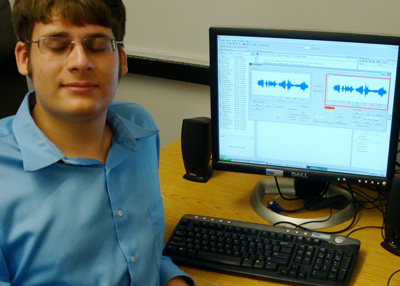 In fall 2009, seven students with disabilities came to the University of Washington's College of Engineering to attend learning labs. The five high school and two college students met with graduate students and the Associate Dean to learn about different kinds of signal processing. Students split into two groups to complete one of two laboratory experiments:
In fall 2009, seven students with disabilities came to the University of Washington's College of Engineering to attend learning labs. The five high school and two college students met with graduate students and the Associate Dean to learn about different kinds of signal processing. Students split into two groups to complete one of two laboratory experiments:
One of the labs, "Sounds You Can See," allowed the students to work on powerful data-crunching computers in the Electrical Engineering department. The students learned how computers process sound and how to recognize sound patterns through the use of visual graphs. Students manipulated different sounds to create unique soundbites.
The second lab, "Understanding Robot Movement," required students to upload data to underwater robots and make observations about their movements. The robots helped students understand how aquatic creatures move through water.
Check the campus calendar at local schools to find out about events of interest to you. Watch for open houses and other activities that are open to the public.
In summer 2009, a dozen students attended a five-day Web Accessibility Workshop to learn how to evaluate the accessibility of websites and computer applications. Wendy Chisholm was the instructor. The students spent time discussing what it means for technology to be accessible and developed a set of criteria to measure the accessibility of a website. After measurable criteria were determined, the students learned about a variety of tools that are used to determine accessibility. Finally, students learned how to document their test results to provide constructive feedback to website developers and managers. Throughout the workshop, students evaluated actual websites to determine their accessibility. The class curriculum is available at https://files.getdropbox.com/u/3401/doit-wat/unit%201/module%201/lesson1.html.
A few students were selected to become paid Interns. The Interns evaluated the accessibility of twenty-five different academic computing departments' websites. These websites had been evaluated several years prior to the 2009 Interns' evaluation. The goal was to determine if the websites had become more or less accessible, or if there had been no change since the previous evaluation. Findings from this evaluation will be sent to the website managers. The evaluation form is available at http://spreadsheets.google.com/viewform?hl=en&formkey=dDB3NVliOXVUN05obzR0bDBJV1o4UlE6MA.
If you would like the accessibility of your website evaluated, contact Wendy Chisholm at chiswa@uw.edu.
This summer, KUOW (Puget Sound Public Radio) broadcast my interview with Jeannie Yandel. We discussed universal design and its benefit for everyone, including people with disabilities. The segment, "Web Accessibility for Everyone" is available at http://www2.kuow.org/program.php?id=18043. A transcript is available at http://sp1ral.com/2009/08/interview-transcript/.
This fall, Minnesota Public Radio's John Moe talked to Darren Burton from the American Foundation for the Blind and myself about technology and disability. I enjoyed our discussion and was happy that we talked about challenging people's assumptions. A recording of the radio program is available at http://minnesota.publicradio.org/display/web/2009/09/23/midmorning2/.
The next wave of HTML, called HTML5, is in development by the Web Hypertext Application Technology Working Group (WHATWG) and the World Wide Web Consortium (W3C). HTML5 is an important step for web accessibility, because it is the first time that people with disabilities have been included in the web language development process from the beginning. Two very different cultures are learning how to work together, and it's both exciting and frustrating.
Accessibility advocates are educating engineers about the technological needs of people with disabilities. Although the engineers can be hard to convince, when they "get it," they often come up with very cool solutions.
On the other hand, when they don't get it and want to move forward with something that is not accessible, it is frustrating. In the past, accessibility has been thrown out for the sake of progress. Once this happens, it is difficult to implement accessibility at a later stage of development.
With HTML5 going into the next development phase, a group of developers and designers from the web standards movement decided to meet to develop feedback for the HTML5 specification. For two days in early August, Dan Cederholm, Tantek Çelik, Jeremy Keith, Ethan Marcotte, Eric Meyer, Nicole Sullivan, Jeffrey Zeldman, and I gathered at Happy Cog Studios in New York City to talk about HTML5. This is a who's who of standards-based web development, and I was honored to be invited to such a powerhouse of a group!
We dubbed ourselves the HTML5 Super Friends and wrote the Super Friends Guide to HTML5 Hiccups as well as a statement that endorses the direction HTML5 is heading. Most of us have written our own blog posts about the issues and advantages we found in the specification. I list my concerns at http://sp1ral.com/2009/08/html-5/.
The reaction to our comments was good. We even appeared in an issue of CSSquirrel, an online comic strip that provides perspective on the politics of web design and standards development at http://www.cssquirrel.com/comic/?comic=35.
Recently, the HTML Working Group met for two days in Santa Clara, California to talk about some of the outstanding issues that need to be addressed before the HTML5 specification can move into the next phase. I attended one day and was happy to see good progress being made on some of the trickier accessibility issues. We aren't out of the woods yet, but the engineers seem open to most of our concerns. Keep your fingers crossed.
Do you know which college degrees are in high demand? In a recent survey* the top ten in-demand college degrees reported by respondents are:
Four out of ten, a whopping 40%, are computer science degrees! That means when students invest their time and money in computing degrees, they are making a good investment. Employers need to find computing graduates to keep their businesses running. This trend is projected to continue well into the future.
* Source: Job Outlook 2009, National Association of Colleges and Employers
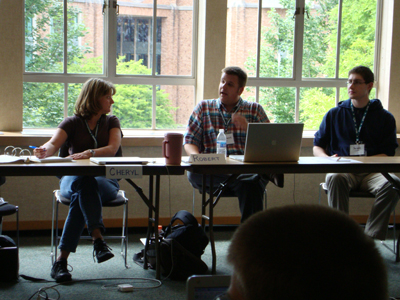 In the last two years, the following projects have received funding through AccessComputing minigrants. Congratulations to all of these recipients for conducting successful projects!
In the last two years, the following projects have received funding through AccessComputing minigrants. Congratulations to all of these recipients for conducting successful projects!
Accessibility Awareness Training Workshop was organized at the University of Maryland Baltimore County to familiarize faculty, staff, and teaching assistants with academic issues affecting students with disabilities.
Connect to AccessComputing project information, resources, and materials.
www.uw.edu/accesscomputing/knowledge-base
Consult Q&As, case studies, and promising practices regarding universal design of instruction; strategies for making computing curricula, classes, labs, and careers accessible; and accessible technology for people with disabilities.
Open-captioned and audio-described videos are available freely online for streaming or download and DVDs are also available for purchase.
www.washington.edu/doit/resources/brochures
Publications are available online or in print format for free or low cost.
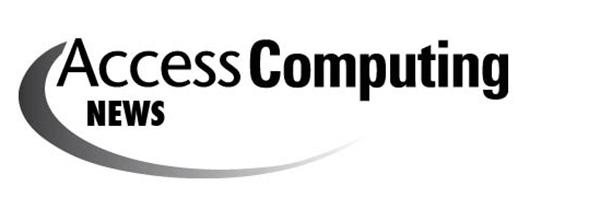
Below are the articles of the AccessComputing News January 2010 newsletter. These articles can also be seen all on one page at the Full Newsletter option.
Led by the Department of Computer Science & Engineering and DO-IT (Disabilities, Opportunities, Internetworking, and Technology) at the University of Washington, AccessComputing partners with Gallaudet University, Landmark College, and Rochester Institute of Technology. AccessComputing alliance partners are AccessSTEM, EAST, MIDWEST, RASEM2, National Center for Women and Information Technology, National Girls Collaborative Project, Commonwealth Alliance for Information Technology Education, Computing Alliance of Hispanic-Serving Institutions, Empowering Leadership: Computing Scholars of Tomorrow, and Advancing Robotics Technology for Societal Impact Alliance.
AccessComputing is supported by the National Science Foundation (grant #CNS-0540615 and #CNS-0837508). Any opinions, findings, and conclusions or recommendations expressed in this material are those of the authors and do not necessarily reflect the views of the National Science Foundation. For further information, to be placed on the mailing list, to request materials in an alternate format, or to donate funds to AccessComputing or DO-IT contact:
University of Washington
Box 354842
Seattle, WA 98195-4842
accesscomp@uw.edu
doit@uw.edu
www.uw.edu/accesscomputing/
206-221-4171 (Fax)
206-685-DOIT (3648) (voice/TTY)
888-972-DOIT (3648) (toll free voice/TTY)
509-328-9331 (voice/TTY) Spokane
Dr. Richard Ladner, PI
Sheryl Burgstahler, Co-PI
To see other newsletters in the full format, visit AccessComputing News (All Articles) List.